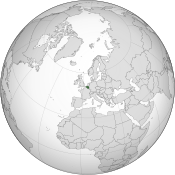After 9 months, Belgian coalition delivers government
Thursday, March 20, 2008

(Image missing from Commons: image; log)
After almost nine and a half months, government formation talks in Belgium have resulted in a new government. New Prime Minister Yves Leterme was sworn in by King Albert II today, together with 15 new Ministers and 7 Secretaries of State. After the election on June 10 last year, a confidence vote in the parliament in Brussels on Saturday is expected to confirm the coalition's promise of a government in time before Easter.
In his inaugural speech, Flemish Christian Democrat Leterme replied to criticism from the media and opposition that his government's manifest was vague and that there was no mutual trust between the coalition partners: "We want to increase the faith in the government, not with empty promises, but with specific measures, by investing in health care, the environment, safety and governmental services."
The coalition partners have set out several deadlines for major decisions on which agreement still could not be reached during the formation. By July 15, a council of 'wise men' has to fill the current empty space of the promised constitutional reforms. Yesterday, a survey published in the media showed that the majority of Belgians lacked confidence in the new government, and believed it will collapse within months. On a party convention yesterday, Leterme pledged he would keep his promise to his constituency, vowing to break up the government if more powers are not devolved to the regions.
The record-breaking political stalemate had promised to be difficult from the start, after the Christian Democrats won the elections in Flanders in coalition with the nationalist party N-VA. The cartel promised more regional autonomy for the northern Dutch-speaking two-thirds majority of Belgium. Negotiations promised to be tough in a country where separate parties for the main ideologies exist in each half of the country.

Leader of the separatist N-VA Bart De Wever expressed his disdain about the new government: "There are more Francophone than Dutch-speaking members in this administration, which doesn't respect the proportions: Flanders has two thirds of the population and three quarters of the wealth."
During the political crisis the previous PM Guy Verhofstadt, who recognised his defeat in the elections and had seemingly withdrawn from the political stage, returned to head a caretaker government at the request of the Belgian King. In his inaugural speech today, the new PM expressed his gratefulness to Verhofstadt for his services. After almost 9 years as the Belgian PM, Verhofstadt presented his successor with the keys of his new residence at Rue de la Loi 16/Wetstraat 16 ("16 Law St."), in Brussels.
'Madame No' Joëlle Milquet, leader of the Walloon Christian Democrats, gave her Flemish colleague Leterme a hard time during the coalition talks because she consistently resisted the Flemish demands for regional autonomy. In the new government she becomes the federal Minister of Work, a department that the Flemish nationalists want to devolve to the regional level.
As the largest political fraction, the liberals seem to have weighed heavily on the coalition. They deliver the vice-Premier and the Ministers for Constitutional Reforms, Finances, Economy, Internal and Foreign Affairs, Asylum and Migration, Agriculture, Sciences and Humanitarian Aid. The French-speaking socialists joined the coalition talks late in the process, while the Flemish socialists remain in the opposition, giving an unprecedented asymmetry to the federal government.
Related news
- "Belgium still without government, new record set" — Wikinews, November 5, 2007
- "Belgian voters decide fate of socialist-liberal coalition tomorrow" — Wikinews, June 9, 2007
- "Belgian formation talks: King consults incumbent PM" — Wikinews, December 3, 2007
Sources
- "Belgium Names Prime Minister, 9 Months After Election" — Voice of America, March 20, 2008
- "Nine months on, Belgium finally gets its new government" — Agence France-Presse, March 20, 2008
- "New Belgian PM faces rocky road" — BBC News, March 20, 2008
- Mu Xuequan. "Belgian new gov't sworn in" — Xinhua, March 20, 2008
- "Leterme in Wetstraat 16" — De Standaard, March 20, 2008 (Dutch)
- "Belgium has a new federal government" — De Redactie, March 20, 2008 (Dutch)




